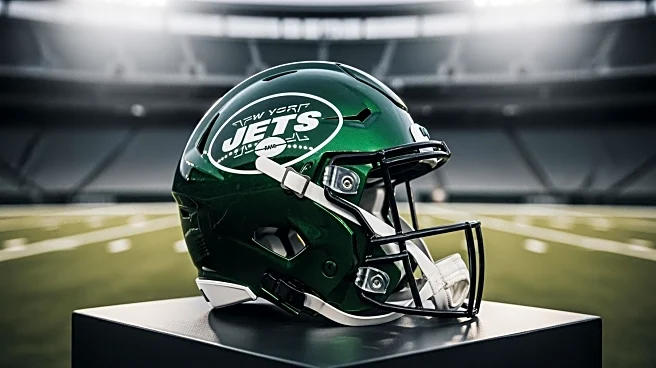What's Happening?
The New York Jets are currently winless in the NFL season, holding a 0-6 record, which positions them for the first overall pick in the 2026 NFL Draft. The team is reportedly considering replacing their
current quarterback, Justin Fields, who has not met expectations as the future leader of the team. According to a mock draft by CBS Sports, the Jets are predicted to select Indiana quarterback Fernando Mendoza as their top choice. Mendoza has shown impressive performance in college football, completing 71.2% of his passes for 1,423 yards, 17 touchdowns, and two interceptions in six games. His success at Indiana has propelled the team to No. 3 in the College Football Rankings, making him a strong candidate for the Jets' future quarterback.
Why It's Important?
The potential selection of Fernando Mendoza as the Jets' new quarterback could significantly impact the team's future. Mendoza's collegiate success suggests he could bring stability and skill to a team struggling to find a franchise quarterback since Joe Namath. This decision could reshape the Jets' strategy and performance in upcoming seasons, potentially improving their standing in the NFL. The move also highlights the importance of drafting and developing young talent to revitalize a team's prospects, especially for franchises with historical challenges in maintaining competitive performance.
What's Next?
As the NFL season progresses, the Jets will continue to evaluate their options for the upcoming draft. The team's management and coaching staff will likely focus on scouting and analyzing potential candidates, including Mendoza, to ensure they make the best choice for their future. The decision will also depend on the performance of other collegiate quarterbacks and the Jets' final standing at the end of the season. Fans and analysts will be watching closely to see how the Jets navigate this critical decision-making period.
Beyond the Headlines
The Jets' consideration of a new quarterback underscores broader trends in the NFL, where teams increasingly rely on young, dynamic players to drive success. This shift reflects the league's evolving strategies in player development and talent acquisition, emphasizing adaptability and forward-thinking approaches. The decision also raises questions about the long-term impact of draft choices on team culture and performance, as well as the pressures faced by rookie quarterbacks in high-stakes environments.










